I am not one of those people who cry at the drop of a hat when watching a film. The high melodrama of most Hindi films, for instance, leaves me mostly cold. Lovers separated rarely elicit a tear, and people dying might make me feel vaguely sorry, but not much more.
What does make me feel really sad is when I see children in distress. Children lost, children helpless and in pain, children scared and hungry and lonely. (And yes, very importantly: child actors who do a good job of acting out these characters)… that is what can bring a lump to my throat.
And that is what The Search did to me.
Set in Berlin, just after the end of World War II, The Search begins with a large group of children, rescued from concentration camps and other places, being brought to an Allied shelter. Thin, ragged, their eyes huge and frightened, these children are, to all purposes, orphaned. Perhaps some of them do have a parent, long-separated from the child by the Nazis, but it will take time to find that parent. And in most cases, there is no hope at all: the child is all alone in the world.

These children have been mistreated so terribly and so long by the Nazis that certain habits have become engrained. Some have had to eat with their fingers so long, they’ve forgotten how to eat with a spoon. Others, used to having their sleeves searched for stolen and hidden bread, leap to their feet with their arms held out as soon as a uniformed officer comes round. He, an Allied soldier, only wants to put some bread back in the basket from which it’s spilled, but the children all jump up, arms out. It’s heartbreaking.
This deeply entrenched fear comes through also in the questioning of the children. One by one, they are asked their names, where they’re from, who their parents are, and so on: anything that will help the authorities trace anybody related who might be alive and willing to take the children.
In the process, some horror stories emerge. One child was witness to his parents’ execution by the Nazis. Another, a quiet girl, had been given the task of sorting through the clothes of executed people at a concentration camp.
Not all the children can manage coherent answers. One boy (Ivan Jandl), wide-eyed and ragged, wearing a cap with a white stripe, only knows three words: the German words for “I don’t know.” Anything they ask him, he only responds to with “I don’t know.” The officers, as well as the lady in charge at the centre, Mrs Murray (Aline MacMahon), finally realize that no matter which language they try talking to him in (even German), he either doesn’t know or has forgotten. There is only one thing to identify him by: the number tattooed on his arm at Auschwitz, from where he’s come.
The children have to be moved to another location, a larger detention centre. For this, large ambulances, each with a large red cross emblazoned on the outside have been arranged. The children are lined up and taken towards the parked ambulances, but as soon as they see the vehicles, panic sets in. Some children try to run, and the panic spreads. It’s with some difficulty that everybody’s rounded up again and Mrs Murray asks one of the interpreters to find out why the children are so terrified of the ambulances.
The truth emerges: the Nazis used to put people in ‘ambulances’ which were really nothing more than moving gas chambers. Jews would be shut in there and gassed.
Mrs Murray quickly gets one of the women with her to get into one of the ambulances with the children, to reassure them that it’s safe. Once all the children are inside the ambulances, the little cavalcade sets off, travelling slowly through the bombed-out remains of the city.
One of the tires on an ambulance bursts on the way, and the loud thudding because of that, combined with the jerkiness of the ambulance, makes the children inside panic. Already suspicious and scared, they try to bang on the locked door of the ambulance. One of the boys finds the toolbox of the ambulance, from which he grabs a hammer and bangs on the glass inset on the back door. It shatters, he is able to open the handle of the door from the outside…
… and by the time the ambulance has stopped, all the children are spilling out of the ambulance and racing off all over the place.
The officers run after them and manage to gather all the children—except two. Two boys, one of whom is the “I don’t know” child, give their pursuers the slip and escape briefly towards a nearby river.
Unfortunately, the current is too swift and one of the boys drowns. The soldiers have caught up by now and try to save him, but they’re too late. In all the confusion, the soldiers are able to bring ashore the body of the dead child, and the cap of the other boy, which is all they can find of him. They assume that he too has drowned.
In the meantime, we, the audience, are given a brief inside view of what had happened. Some years back, the Maliks were a wealthy Jewish family living in Prague. Wealthy, cultured, perhaps even a little too sheltered from what was going on around them. As Mrs Malik (Jarmila Novotna), her husband, teenage daughter and young son Karel (this turns out to be the little boy who kept saying “I don’t know”) play music in their beautiful house, the Nazis burst in.
In a voiceover, we are told that the Maliks got separated, Mr Malik and his daughter being shunted off to once concentration camp (where both were later killed) and Mrs Malik and Karel being sent off to another, from where they too were separated from each other.
And now Mrs Malik goes from one detention centre to the other, looking for her long-lost son. Everywhere, she comes up against the same regretful answer: they have no boy in their charge named Karel Malik. Finally, she arrives at a detention centre where, out of the blue, the tired Mrs Malik is given the best news she could possibly have hoped for. The officer in charge says that yes, they do have a boy named Karel Malik, he’s one of their choir boys. In fact, he, the officer, will fetch Karel for her right now.
Mrs Malik’s hopes are dashed, of course, because the little boy (Leopold Borkowksi) who is brought, in his choir boy’s robes, is not Karel; he’s a complete stranger. Mrs Malik tries talking to him in her mother tongue, Czech, but the boy is all at sea. She tries Polish, and this time she makes a breakthrough. It eventually turns out that this boy has been posing as Karel Malik—a name neutral enough to blur the bearer’s religion. Because this child, whose real name is Joel Makowsky, is of course Jewish, and hasn’t learnt to trust the Allies enough to know that his being Jewish doesn’t matter anymore.
The officer in charge reassures Joel (and later takes off Joel’s surplice, so that he doesn’t need to masquerade as Catholic anymore), but an anxious Mrs Malik isn’t done yet. How and where did Joel hear Karel Malik’s name, she wants to know. Joel explains that it was at the camp; during roll call, Karel Malik’s name was called out, and nobody responded to that name. So Joel, reasoning that nobody would know any better, appropriated the name for himself. And when, after the fall of the Third Reich and the children’s rescue by the Allies, Joel was assumed to be Catholic, so he played along. It was safe to be in a surplice.
Another dead end for Mrs Malik.
Unknown to her, though, not too far away, her son’s path has just crossed that of an American soldier named Ralph ‘Steve’ Stevenson (Montgomery Clift). Steve, sitting in his jeep by the side of the road and eating a sandwich, notices a scrawny, dirty little face peeking up from among the ruins, only to dive down out of sight as soon as Steve notices him. A few more such moments, of quick peeks, and subsequent hiding, and Steve, by simply looking non-threatening (and holding a half-eaten sandwich that looks very appealing) is able to entice this boy out of the ruins. Long enough to toss the remaining bit of the sandwich to the boy.
Karel Malik, who this is, grabs the sandwich and wolfs it down. Steve realizes he’s much hungrier and more far gone than Steve had imagined, and so Steve resorts to subterfuge. He gets out of his jeep, places an entire sandwich on a concrete block that’s lying beside the road, and then gets back into his jeep. He drives off, and as soon as he’s gone, Karel comes running down from the ruins to snatch up the sandwich—only to find that Steve, who has surreptitiously turned his jeep around a little way down the road, has come back. Steve grabs him, and though Karel puts up a stiff fight, he’s no match for the strong and fit young soldier.
Steve bundles up Karel and takes him to the house he’s sharing with a colleague, Jerry Fisher (Wendell Corey). Here too it is impossible to get Karel calmed down; he’s terrified, certain that Steve and Fisher (who’s come home) are going to hurt him. All he wants is to run, even if it means running into the ruins, with no shoes on his feet and barely any clothing and no food. At least he’ll be free.
But Steve has other ideas, and within the space of that first day, he’s involved himself completely in the welfare of this terrified child whom Steve, for want of a name to call him, dubs Jim. Jim, who has no recollection of being Karel.
And whose mother, somewhere, searches for him.
What I liked about this film:
The story (which was the handiwork of several people, supposedly among them Montgomery Clift himself), which is poignant and at times disturbing when you think about what children like these went through. It is definitely designed to tug at the heartstrings, as they say, and it does that well.
The very fact that director Fred Zinnemann did the filming in post-war Berlin (The Search was the first Hollywood film to be filmed in Germany after the war): the bombed city, the devastation that can be seen all around, the very realization that the child actors in the film did live through the war (even if they hadn’t seen it at close quarters): all of this helps make it seem even more real.
And, Montgomery Clift as Steve and Ivan Jandl as Karel/Jim. Clift was nominated for a Best Actor Academy Award (his first nomination), and Jandl won a Juvenile Award for his performance. Both of them are brilliant: the lost, lonely, desperate boy and the humane soldier who takes him under his wing are brought beautifully to life by these two. Interestingly, Clint Eastwood marked this role of Clift’s down as one of the biggest influences on Eastwood as an actor. Considering this was only Clift’s second film, that says a lot for his talent.
What I didn’t like:
Nothing, really. Some say it’s melodramatic. But I didn’t think that, and I loved it.
But yes: why on earth did this film get this poster? Did someone just give the artist a one-line artistic brief about a woman searching for a boy? Was that why this curvy female has a torch in hand? That is a sad misinterpretation of both the story as well as the tone of The Search.

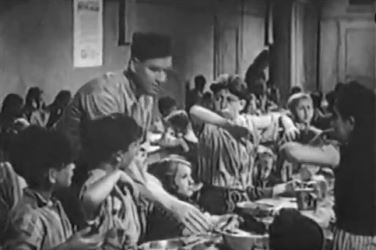
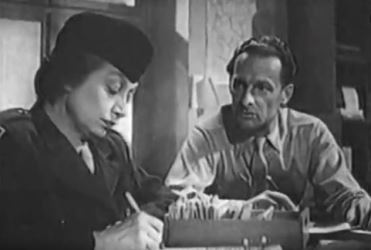
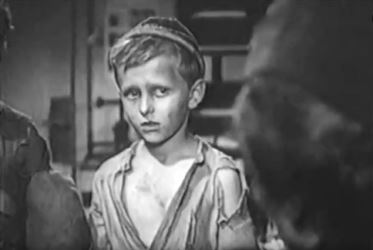


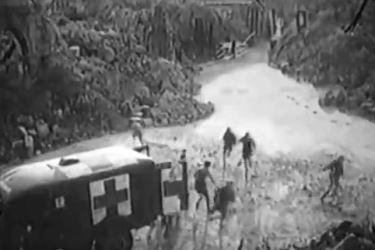
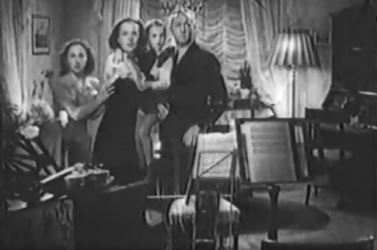
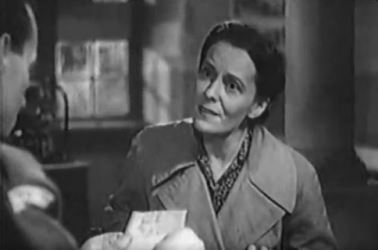
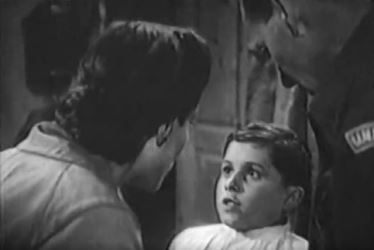
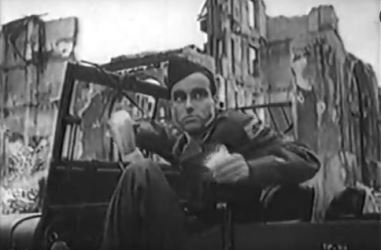
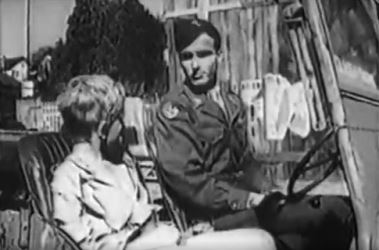
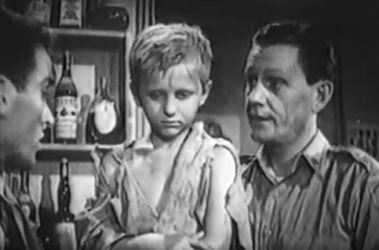
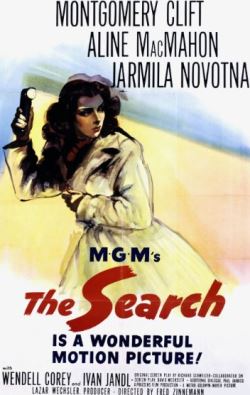
An exceptionally good review even by your consistently high standards. I shall make it a point to get hold of this movie.
LikeLike
Thank you so much, Abhik! Yes, do look for this one – it’s especially good.
LikeLike
I don’t know about the movie, but your review was exceptionally poignant and sensitive. Brought tears to my eyes
Nitin
LikeLike
You are very kind, and very encouraging. Thank you so much.
LikeLike
Nice post Madhulika. I saw the film very long ago, but remember bits of it vividly. And oh yes, the Clift of the late 40s. I hosted an online film-club discussion around The Heiress recently, and while it was mainly a tribute to Olivia de Havilland, there was some gawping about how beautiful Monty was.
(One thing: The Search was released in 1948, not 1959)
LikeLike
Oh, yes. I remember watching The Heiress and gawping, too! He was gorgeous in that. :-)
Thank you for pointing out that error, Jai. My mind is coming loose of its moorings.
LikeLike
I found myself tearing up just reading this review, Madhu. :( And while I’m in no mood for such a sad story, your review makes me want to watch it so much. (Just tell me it ends happily for little Jim/Karel, even if I know it didn’t for thousands of other Karels!)
LikeLike
While the premise is sad, and you can’t help but be deeply distressed by the plight of these children, the way Steve takes Jim under his wing and becomes his pal, it becomes more a story of hope and humanity. And the end is very happy. :-) I was sitting at the end, with tears streaming down my face, and the LO (who came in just then and saw Mommy crying) was very puzzled when I told her they were tears of joy!
LikeLike
This is such a wonderful post. Im going to watch this film soon. Thanks for the review
LikeLike
Thank you so much! I hope you like this film as much as I did.
LikeLiked by 1 person
Great film and a wonderful review !
I am going to watch it right away.
Its there on youtube. Here :
LikeLike
Oh, good you found it on Youtube! I do hope you like it as much as I did. Let me know what you thought of it.
LikeLike
A wonderful review! I’m not a film-watcher and am unlikely to watch this film either, but just reading about it is so moving.
LikeLike
Thank you so much for the appreciation. I’m glad you enjoyed this review.
LikeLike
Madhu, I wonder how you were able to watch it. Like you, I cannot watch films where children and animals are shown as mistreated or exploited, even if they have happy endings.
LikeLike
Technically, this film doesn’t show the children being ill-treated or exploited; it shows the aftermath of ill-treatment. There’s a difference. And the fact is, the kindness and gentleness of Steve, plus the way Mrs Murray (and a few others) come together to take care of Jim/Karel and to ensure he is reunited with his mother – it’s very heartwarming.
LikeLike
Thanks ..
This seems the movie I must watch right now
LikeLike
Please do, ak. I really loved it.
LikeLike
Wonderful review Madhulika !! your reviews are so interesting that they compel me to watch those films which I otherwise would never add to my ‘To Watch’ list :)
LikeLike
Thank you so much! Your appreciation and encouragement mean a lot. :-)
LikeLike
Thanks for your fantastic review.
I loved this film when I first watched it about 50 years ago. It is one that leaves a lasting impression.
Tonight ( August 2023) I have watched it again after purchasing the dvd. Must admit to shedding a tear at the end, although it was a happy ending.
Montgomery Clift was great and his performance was very natural. The young boy actor, Ivan Jandl, was particularly impressive and I can understand why he received a special junior academy award. ( I read where a minor planet was named after him.)
I will be showing it to my U3A film group.
LikeLiked by 1 person
Thank you for your kind words. Yes, indeed: this is a wonderful film, and Ivan Jandl’s acting was excellent – even though it’s been a while since I watched this one, I remember him vividly.
LikeLike
Wonderful review, Madhulika, which I found from the link on your post about “The Bad Seed.” Two things to mention: “The Search” was not the only movie released in 1948 that was filmed in postwar Berlin: Billy Wilder’s “A Foreign Affair” opens with aerial shots of the devastated city, block after block after block of ruins. And I was surprised to see Aline MacMahon’s name in the credits. She was a brilliant comedienne in the great “Gold Diggers of 1933,” and through your post I discovered that she had a long and distinguished acting career in both comic and dramatic roles. Many thanks for highlighting this film, which is now at the top of my to-watch list.
Best,
P.
LikeLiked by 1 person
I am glad you enjoyed this review, thank you – and for the recommendation of Gold Diggers of 1933. That was a film I hadn’t heard of, but I’ve added it to my wishlist now! It sounds thoroughly entertaining.
LikeLike